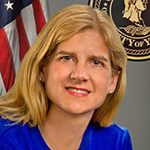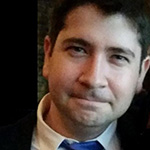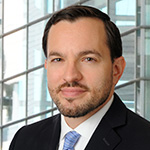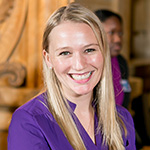Learn what motivated 6 Stein graduates to work for city and state authorities.
Gail Eckstein ’03, New York City Department of Education
Jeannie Gallego ’08, New York City Department of Education
Wilson Kimball ’00, City of Yonkers
Adam Libove ’07, New York City Department of Investigation
Nicholas Mitchell ’07, City and County of Denver
Rebecca Kagan Sternhell ’12, Mayor’s Office of Federal Affairs, Washington, D.C.
Gail Eckstein ‘03, Attorney for Special Education Appeals Unit, New York City Department of Education
I currently work as an appeals attorney for the New York City Department of Education (“DOE”) in the special education unit. To the extent that a parent is dissatisfied  with the educational plan that is set forth by the DOE for their special needs child, the parent can bring a lawsuit against the DOE if the matter fails to be resolved during a prescribed resolution period. Litigators in the special education unit handle these cases at the administrative hearing level, and then the appeals unit assumes responsibility should the parent or the DOE decide to appeal the administrative decision.
with the educational plan that is set forth by the DOE for their special needs child, the parent can bring a lawsuit against the DOE if the matter fails to be resolved during a prescribed resolution period. Litigators in the special education unit handle these cases at the administrative hearing level, and then the appeals unit assumes responsibility should the parent or the DOE decide to appeal the administrative decision.
Prior to working at the DOE, I worked at private law firms for nine years following law school graduation. I enjoyed my time at the firms, but felt ready to explore the government and/or non-profit world in my next position. As opposed to the private sector, working for the DOE presents challenges unique to the government context. Although the City is ultimately my client, I also have a duty to promote the public good. This may present a conflict, as my job involves allocating limited government resources amongst the special education students who need them in the most efficient way possible. In order to resolve this struggle, it is important to look at the broad picture and address the overall scenario, as opposed to looking narrowly at a particular program or therapy that the student might be participating in. Bureaucracy is definitely a challenge of working in city government, but I believe that things are changing for the better in terms of decreasing the administrative hurdles that one must face in order to get their work done.
I would advise anyone thinking of working for the government to contact alumni who are currently in these positions, and arrange informational interviews to the extent possible. These opportunities can be invaluable in terms of learning more about the desired position, and about working for the government in general. I also encourage people to seek out government positions after working in the private sector, as I found that the skills that I learned at law firms easily transitioned to my new government role.
 Jeannie Gallego ’08, Assistant Counsel, Office of Equal Opportunity and Diversity Management, New York City Department of Education
Jeannie Gallego ’08, Assistant Counsel, Office of Equal Opportunity and Diversity Management, New York City Department of Education
I work as Assistant Counsel in the Office of Equal Opportunity and Diversity Management with the New York City Department of Education. I love that my work encompasses different aspects of lawyering, ranging from conducting legal research and investigating discrimination claims within our schools, to examining the participation of Minority and Women-Owned Business Enterprises (MWBE’s) in our procurement process and brainstorming to create and implement initiatives to increase the participation of MWBE’s in order to achieve compliance with the School Governance Law and applicable MWBE regulations/requirements.
I have been working here for approximately two and a half years. My interest in this position stemmed from my long-standing passion and commitment to diversity and public service. From an early age, I volunteered in organizations that enhanced diversity and equity in our society and provided more access to opportunities for disadvantaged groups. By working here, I am able to continue to support and work towards these ideals of diversity and inclusion.
By working here, I am able to continue to support and work towards these ideals of diversity and inclusion.
It is difficult to offer a piece of advice to recent graduates or those interested in pursuing government work, because what works for one person might not work for another. As obvious as this may sound (but surprisingly easy to forget at times), I would simply say:
- Believe in yourself.
- Keep reaching out and maintaining contact with people who share similar passions and interests (especially directed at the introverts – like myself – out there).
- Remember that, typically, your first job out of law school will not be your last.
Hopefully, keeping these points in mind will make the post-graduate ride more enjoyable.
Wilson Kimball ’00, Commissioner of Planning and Development for the City of Yonkers
When I was 9 years old my mother went back to school (Northeastern Law School in Boston) to become a lawyer. I spent a lot of time with her there and in the law library. In order to explain this huge change/transition (she had been a stay at home mother), she bought me a lot of children’s books on the Supreme Court, the Constitution and Oliver Wendall Holmes. I guess at that time it got into my head that I wanted to be a part of the U.S. government, most likely as a lawyer because it was clearly important work.
clearly important work.
The first time I ever heard of Yonkers, New York, I was sitting in George Cochran’s constitutional law class during summer school. We were reading about the desegregation order and I thought “Wow, these people are crazy!” Now that I actually administer the desegregation order as part of Planning & Development, I see that there were a lot of forces at play and while some of the residents of Yonkers acted deplorably there were a lot of bad actors from all sides of that dispute.
You will see part of the story this fall on HBO in Show Me A Hero, based on Lisa Belkin’s book.
About once a month I text a friend to say “my heart is full.”
About once a month I text a friend to say “my heart is full.” It could be because I found housing for a mother with two children, one of whom is disabled, and the county cut off her DSS for no reason. I fought long and hard to help that woman and we were both crying when the county came through with 8 months back rent, which allowed me to match the amount with city monies. Or it could be helping the middle aged woman who, because of a family illness (and the resultant bills), lost her home. She needed our help and we found her housing. Don’t get me wrong, I love landing the 100 million dollar construction deals or business openings/relocations, but for me I know my heart is full when I solve someone’s problem who didn’t have a voice/felt disenfranchised/didn’t know where else to turn.
Government isn’t always “my heart is full” moments. It can be long hours for relatively little pay. It can be compromising on things you think are important just to move the ball forward one yard. It isn’t “Law & Order” either, because sometimes the government isn’t right. But when it works, when you help people or when you move something forward that you know is important, it can be very rewarding. You just have to know what motivates you and how you want to live your life.
In terms of trends in the field, three areas I think will be particularly important down the road: health care policy, baby boomer debt and “green” codes. Everyone is debt strapped and we have no idea how that will play out as people age and pass away. With respect to “green” codes, we just changed the solar roof code in Yonkers a few years ago and now more solar roofs have been installed in the last year than in the previous decade. Changing our zoning code to be environmentally forward-thinking has placed my boss, Mayor Mike Spano, at the top of New York State and even the nation’s list of green mayors.
In addition to helping individual constituents, I also get tremendous satisfaction from managing the economic development projects. Right now, I am sitting on approximately one billion dollars worth of approved economic development projects that Mayor Spano has brought to Yonkers. That will translate into construction jobs, long-term jobs, housing, entertainment and sports & leisure opportunities, all of which will have a big impact if we are able to see this through the next four years. We also received a number of awards for the daylighting of the Saw Mill River, where we literally peeled back tar and concrete and knocked down buildings to expose the Saw Mill River, which transformed downtown Yonkers into a Venice-type city. It was an environmental initiative that turned into an economic development driver. I oversee community development, sustainability, planning, economic development and downtown waterfront development. The daylighting of the Saw Mill River fell into four of those five categories!
Going to Fordham helped me think in a linear, clear and balanced way.
If you work in government, your temperament has to be set on a certain dial. You have to want to help people. You have to be able to figure out how to help people with little to no resources, because there will be some days when you can’t even find a pen on your desk to write with because budgets are so tight. Going to Fordham Law helps too because it gives you instant credibility, even if you work in government not as an attorney. Going to Fordham helped me think in a linear, clear and balanced way. When you go out into the world, you don’t realize how many bad writers there are out there and how Fordham Law has honed your skills and made you persuasive and given you that hand up that maybe others don’t have. One time, I read a state report on the alienation of parkland and outlined a memo on the subject for a project. The lawyers on the project were impressed that I briefed a 100 page document for a meeting, even though it wasn’t required. I am a lawyer, even though I don’t work as one in my capacity as Commissioner of Planning and Economic Development for the City of Yonkers. I think most people have low expectations of government employees, the so called “bureaucrats” and I enjoy turning that expectation on its head!
I think the Stein Scholars Program is awesome because it gives you the two summer internships to really delve into the public sector, and I would be remiss if I didn’t give a shout-out to Tom Schoenherr for all of his help. I think it would be great for Fordham to also have a work-study program similar to the one at Northeastern. I see a lot of lawyers coming out of law schools who can’t get jobs because they may only have their summer internships in a legal related field. Additionally, I think I would have liked to work in a large firm to know it wasn’t for me. I was lucky because I went to school at night and was an older student. I had worked at a real estate appraisal firm and knew that even though I was the top biller month after month I wasn’t fulfilled. Not everyone has that experience and then can say they know for sure they chose the right course. Don’t be afraid of taking classes or having legal experiences that are bad ones because you learn things even from bad experiences, you learn what you don’t want. I wish I had learned that at Fordham, but I learned it a little before and a little after law school. Honestly, I loved Fordham so much I couldn’t wait to get to class and learn stuff, which maybe makes me crazy. I don’t know. All I know is that I loved every day of it because if I am not overwhelmed with work I don’t know what to do with myself!
Adam Libove ’07, Senior Assistant District Attorney in the Public Integrity Bureau of the Kings County District Attorney’s Office; New York City Department of Investigation, Counsel to the Inspector General (until July 2015)
 I decided to work in government because I wanted to practice criminal law and represent the People. Between college and law school, I worked for the Manhattan District Attorney’s Office as a paralegal, and I loved it. I worked for six prosecutors, ranging in experience and case type. It was fast-paced, challenging and never boring. As a paralegal, I compiled the factual evidence for trial and interfaced with a host of city, state and federal agencies. At the time (2003-2004), paralegals did not have internet access, so the job required a never-ending series of phone calls, faxes and visits. The assignments I found most rewarding were those where I functioned as a co-strategist along with the Assistant.
I decided to work in government because I wanted to practice criminal law and represent the People. Between college and law school, I worked for the Manhattan District Attorney’s Office as a paralegal, and I loved it. I worked for six prosecutors, ranging in experience and case type. It was fast-paced, challenging and never boring. As a paralegal, I compiled the factual evidence for trial and interfaced with a host of city, state and federal agencies. At the time (2003-2004), paralegals did not have internet access, so the job required a never-ending series of phone calls, faxes and visits. The assignments I found most rewarding were those where I functioned as a co-strategist along with the Assistant.
After law school, I worked for Troutman Sanders in commercial litigation for about five years. It was a priority for me to pay back my law school loans, but I found the work interesting and intellectually stimulating, plus I learned a ton about litigation. At the five year mark, I decided to transition to criminal law. I applied to several state and federal prosecutors’ offices and landed at the New York City Department of Investigation (DOI). DOI is the City’s watchdog, and its jurisdiction is very broad. Investigations may involve any agency, officer, elected official or employee of the City, as well as contractors who do business with or people who receive benefits from the City. Once DOI substantiates criminal wrongdoing, it refers the matter to a District Attorney’s Office, the United States Attorney’s Office or the Attorney General’s Office but does not generally prosecute the case itself.
I decided to work in government because I wanted to practice criminal law and represent the People.
While at DOI, I was Counsel to the Inspector General (IG) mainly responsible for the Departments of Correction (DOC) and Probation. In that role, I provided legal advice to the IG and conducted investigations into the above agencies and contractors doing business with them. The DOC cases dealt mainly with excessive uses of force by Correction Officers against inmates or contraband smuggling by DOC employees or contractors. I was typically assigned the more paper intensive cases where a contractor engaged in overbilling or fraudulent billing. These cases generally required a lot of subpoenas, document review and investigative interviews akin to depositions.
At DOI, I was also the Director of the Bureau of City Marshals. In that role, I managed all aspects of DOI’s oversight of the New York City Marshals, including evaluating allegations, supervising and conducting investigations, interfacing with complainants, witnesses and Marshals and reporting unit indicators to executive staff. The main type of criminal investigation I conducted during my tenure as Director were falsified Notice of Eviction or Warrant of Eviction cases where a landlord or management company would falsify a marshal’s notice in an attempt to get a tenant to move out or pay rental arrears. We substantiated two of these cases and referred them to the Manhattan and Bronx District Attorney’s Offices.
On August 10, I began working as a Senior Assistant District Attorney in the Public Integrity Bureau of the Kings County District Attorney’s Office. Although I found my time at DOI rewarding, I decided to move on because I had always wanted to be a prosecutor, and I missed being in court. I am looking forward to being able to prosecute the cases that I investigate.
My advice for students or graduates who are thinking about pursuing a government-related position is to do it as soon as possible. In my quest to become a prosecutor, I found that offices hire very few laterals, so it was an uphill battle. I would advise students who want to be ADAs to intern for a summer and then apply directly out of law school.
Nicholas Mitchell ‘07, Independent Monitor, Office of the Independent Monitor, City and County of Denver
Consider the adjectives most frequently deployed in the public discourse about government: “ineffective,” “bloated,” “useless,” etc. We have all heard them a million times. These descriptions of government are often terribly misguided. They are also destructive, and may, unfortunately, deter some young lawyers from pursuing careers in public service.
As Denver’s Independent Monitor, I oversee all investigations into approximately 2,300 law enforcement officers on Denver’s streets and in its jails. I also issue data-driven reports that assess the constitutionality of the policies, practices and training of the Denver Police and Sheriff Departments. My role is fascinating, challenging, and more engaging than any that I have held before (including my years in a large New York firm). In my time in government, I have met countless government lawyers at the local, state and federal levels who are extraordinarily dedicated and committed. Many of them are also satisfied with the impacts that they have, and their ability to truly work “In the Service of Others.”
Rebecca Kagan Sternhell ’12, Assistant Corporation Counsel for the NYC Law Department in the Mayor’s Office of Federal Affairs in Washington, D.C.
Prior to law school, I worked as a Medicaid budget analyst with the New York City Office of Management and Budget. In that capacity, I worked with a lot of the NYC Law Department and the City’s intergovernmental teams, so I knew early on that I wanted to work for the City once I graduated from law school.
 I have served under mayors Bloomberg and de Blasio. There are many unique and rewarding aspects to working for the City, but at the same time it can be challenging. For example, you might be asked to work on policies you don’t necessarily agree with. There are also the changes in policy and approaches with different administrations. I am not a political appointee, but there were still transitions in terms of priorities. In working for the City, and certainly my role in the Federal Affairs office, one is never immune from the political aspects of the job, so one needs to be prepared for that to be a factor – even in legal analyses.
I have served under mayors Bloomberg and de Blasio. There are many unique and rewarding aspects to working for the City, but at the same time it can be challenging. For example, you might be asked to work on policies you don’t necessarily agree with. There are also the changes in policy and approaches with different administrations. I am not a political appointee, but there were still transitions in terms of priorities. In working for the City, and certainly my role in the Federal Affairs office, one is never immune from the political aspects of the job, so one needs to be prepared for that to be a factor – even in legal analyses.
My office is based in Washington, D.C., and I am the City’s one remote attorney. Los Angeles and Chicago have offices here too. NYC is bigger than a lot of states, so federal policies can have huge implications for us. This also cuts two ways – people love NYC but also get tired of hearing about it. Moreover, much of the federal body of law deals directly with states and we are not a state, which can be maddening, but given our size and capacity, we also have clout. My chief job is to maintain a deep understanding of many of the federal laws and regulations and how they relate to the City and its governing laws.
I helped draft some of the current provisions of federal law that remedied issues with Sandy aid and flood insurance.
I was particularly active after Hurricane Sandy devastated many New York City neighborhoods. My office was involved with securing funding and navigating regulations to help with post-storm recovery. There were a myriad of issues, including nonprofits seeking federal aid, flood insurance provisions, transportation funding, etc. I know more about FEMA regulations and particularly flood insurance than anyone could really want. But given this, I helped draft some of the current provisions of federal law that remedied issues with Sandy aid and flood insurance.
My advice to students is to maintain relationships with supervisors from your internships. I interned for the City during my 1L and 2L summers. Maintaining and developing my connections with the City and my supervisors throughout law school helped me to secure my position upon graduation. I continued to intern part-time during my 3L year working on the City’s Voting Rights Act pre-clearance requirements (now no longer an issue), and was the primary drafter of the amicus brief to the Supreme Court in the Shelby County v. Holder case when I started my job. By maintaining connections and doing good work, I had advocates and allies in getting my current job. With a depressed job market and many qualified law students seeking public interest work, one of the key things we look for in interviewing is, “Would I want to work with this person?” People want to make sure that new hires will develop into true colleagues because the work can be stressful and we’re not making Big Law salaries.
